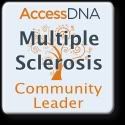
My Tysabri Diary...the tag above was created by a friend of mine who had MS (today would have been her birthday-she was such a nut-lol, and I miss her, but she is no longer suffering and this eases my loss.)
First, thank you ALL for your comments here (I've tried to respond to as many as I could in the comment section of my Blog), and a special thank you to those that left a comment to that creep on the "cafe pharma" site...makes me wonder what rock that A-hole (sorry) crawled out from under......geeeeeeeeez louise!
On a happier note (happier to me anyway)...Here is an excellent Article (Findings) regarding Permanent Damage caused in MS, and my comments left re: early Tysabri therapy as a first line defense...
It's a long read but well worth it as the conclusions reached were EARLY treatment is needed to try and prevent the lesions (including "silent lesions") from causing permanent damage... here's the published Findings/Article: http://tinyurl.com/2tgneo
My comments left: A very well written article. Of particular interest to me were the following conclusions: "..damage from lesions that are “clinically silent” (that is, those that don’t cause obvious symptoms), from lesions in the gray matter of the brain, and from the cumulative loss of axons (Figure 2) all underlie the permanent disability that most people with MS eventually experience."
"..Damage from clinically silent lesions is significant. Magnetic resonance imaging (MRI) has been extremely useful in extending researchers’ understanding of MS. MRI scans show that there are many more lesions in the nervous system of many people with MS than might be expected from their disabilities. This seems to be because most lesions occur in parts of the nervous system that are not immediately responsible for some sort of behavioral output, like walking or speaking, or for sensory perception. Therefore, even during the “remitting” phases of RRMS, there is generally ongoing damage from MS in these clinically silent lesions. Therefore, damage to the nervous system can be much more extensive than would be guessed by looking at a patient’s symptoms alone".
"..The studies described here support the idea that anti-inflammatory treatment of MS should begin as early in the course of the disease as possible. By extension, suspected MS should be verified as quickly as possible, because many patients have silent lesions for years before their first acute neurological episode, and it is important to minimize this early damage. Likewise, treatment should be continued between relapses, to prevent or minimize damage from clinically silent lesions".
As a patient with MS for 31+years, only re-classified as SPMS with relapses in mid-2005, I am now gratefully and thankfully on Tysabri(Natalizumab) therapy as I have not had one relapse nor disease progression since 10/06 (re-started Tysabri at that time when it became available again). I believe your article further supports the use of Tysabri's superior efficacy of 67% as a first line defense against MS, which is needed in EARLY treatment of MS, as it's Label states in part: "TYSABRI® is indicated as monotherapy for the treatment of patients with relapsing forms of multiple sclerosis to delay the accumulation of physical disability and reduce the frequency of clinical exacerbations." Thank you for a wonderfully written article. Lauren Roberts
(((hugs))) to all of you reading my Blog :)
Love, Lauren
A very proud member of www.MSpatientsforchoice.org


















